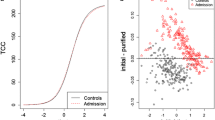Abstract
The Psychiatric Assessment Schedule for Adults with Developmental Disability (PAS-ADD) is a semi-structured interview for use with respondents who have learning disability and for key informants. This report investigates the ability of the instrument to detect symptoms that had been found to exist during routine clinical assessment of the patients. Field trials involved 95 referred patients with learning disability and a key informant for each sample member. Clinical opinions of the referring psychiatrists were sought using a symptom checklist. Referrer checklist symptoms and PAS-ADD data were both factor analysed. Validity testing involved (a) computation of correlations between PAS-ADD factors and checklist data and (b) comparison of PAS-ADD and referrers' diagnoses. Results indicated good validity for the PAS-ADD in relation to psychotic symptoms and depressive symptoms. Anxiety symptom identification was not well validated, probably due to small numbers. Expansive mood identified by the referrers was not detected by the PAS-ADD because there is currently no corresponding section in the interview. Where the PAS-ADD produced a diagnosis (in 58 members of the sample), 44 were in agreement with the referrer. Probability of diagnosis by PAS-ADD increased with the number of relevant active symptoms identified by the referrer. The PAS-ADD has been shown in a previous report to have the sensitivity to detect mental disorders not known to psychiatric services. For psychotic and depressive conditions, our results showed that symptom detection was in good agreement with the information provided by the referring psychiatrists on their patients. The PAS-ADD needs a section on hypomania and further investigation of its detection of anxiety disorders.
Similar content being viewed by others
References
Day K (1985) Psychiatric disorder in the middle-aged and elderly mentally handicapped. Br J Psychiatry 147: 660–667
Hogg J, Moss SC (1989) A demographic study of older people with mental handicap in Oldham Metropolitan Borough. H.A. R.C. University of Manchester, Manchester
Hogg J, Moss SC (1995) The applicability of the Kaufman Assessment Battery for children (K-ABC) with older adults (50+years) with mental retardation. J Intellect Disabil Res 39: 167–176
Menolascino FJ (ed) (1970) Psychiatric approaches to mental retardation. Basic Books, New York
Moss SC (1991) Age and functional abilities of people with a mental handicap: evidence from the Wessex mental handicap register. J Ment Defic Res 35: 430–445
Moss SC (1995) Methodological issues in the diagnosis of psychiatric disorders in adults with learning disability. Thornfield J (Univ. of Dublin) 18: 9–18
Moss SC, Patel P (1993) Prevalence of mental illness in people with learning disability over 50 years of age, and the diagnostic importance of information from carers. Ir J Psychol 14: 110–129
Moss SC, Hogg J, Horne M (1992) Individual characteristics and service support of older people with moderate, severe and profound learning disability with and without community mental handicap team support. Ment Handicap Res 6: 3–17
Moss SC, Ibbotson B, Prosser H (1994) The Psychiatric Assessment Schedule for Adults with a Developmental Disability (the PAS-ADD): interview development and compilation of the clinical glossary. H.A.R.C. University of Manchester, Manchester
Moss SC, Patel P, Prosser H, Goldberg DP, Simpson N, Rowe S, Lucchino R (1993) Psychiatric morbidity in older peopie with moderate and severe learning disability (mental retardation). Part I. Development and reliability of the patient interview (the PAS-ADD). Br J Psychiatry 163: 471–480
Moss SC, Prosser H, Goldberg DP (1996a) Validity of the schizophrenia diagnosis of the Psychiatric Assessment Schedule for Adults with Developmental Disability (PAS-ADD). Br J Psychiatry 168: 359–367
Moss SC, Prosser H, Ibbotson B, Goldberg DP (1996b) Respondent and informant accounts of psychiatric symptoms in a sample of patients with learning disability. J Intellect Disabil Res 40: 457–465
Nihira K, Foster R, Shellhaas M, Leland H (1974) AAMD Adaptive Behavior Scale, 1974 revision. American Association on Mental Deficiency, Washington, DC
Patel P, Goldberg DP, Moss, SC (1993) Psychiatric morbidity in older people with moderate and severe learning disability (mental retardation). Part II. The prevelence study. Br J Psychiatry 163: 481–491
Reid AH (1983) Psychiatry of mental handicap: a review. J R Soc Med 76: 587–592
Reiss S, Benson BA (1985) Psychosocial correlates of depression in mentally retarded adults. 1. Minimal social support and stigmatization. Am J Ment Defic 89: 331–337.
Rutter M, Lord C, Lecouteur A (1991) Autism Diagnostic Interview-R. Institute of Psychiatry, London
Sovner R, Hurley DA (1983) Do the mentally retarded suffer from affective illness? Arch Gen Psychiatry 40: 61–67
Spitzer RL, Endicott J, Robins E (1978) Research diagnostic criteria: rationale and reliability. Arch Gen Psychiatry 35: 773–782
World Health Organisation (1992) Schedules for Clinical Assessment in Neuopsychiatry, version 1. WHO, Geneva
World Health Organisation (1993) The Tenth Revision of the International Classification of Mental and Behavioural Disorders (ICD-10): diagnostic criteria for research. WHO, Geneva
Zimmerman M, Coryell C, Corenthall C, Wilson S (1986) The research diagnostic criteria for endogenous depression and the dexamethasone suppression test: a discriminant function analysis. Psychiatr Res 14: 197–208
Author information
Authors and Affiliations
Rights and permissions
About this article
Cite this article
Moss, S., Ibbotson, B., Prosser, H. et al. Validity of the PAS-ADD for detecting psychiatric symptoms in adults with learning disability (mental retardation). Soc Psychiatry Psychiatr Epidemiol 32, 344–354 (1997). https://doi.org/10.1007/BF00805440
Accepted:
Issue Date:
DOI: https://doi.org/10.1007/BF00805440




